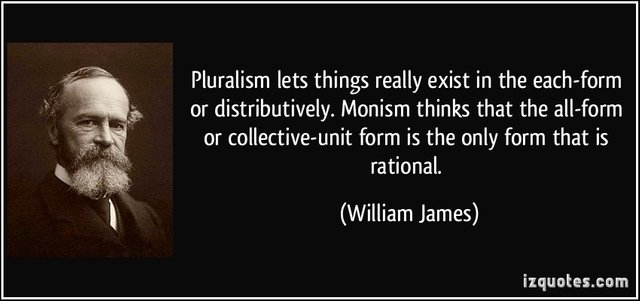Materialism and Spiritualism

Image Source
The initial forms of monism is Materialism. It is not a doctrine to which the principal desire of the plain man drives him at the current time. Indeed, even the individuals who have done no perusing in philosophy have acquired many of their methods for taking a gander at things from the masterminds who lived in the past, and whose conclusions have turned into the regular property of cultivated men. For more than two thousand years the world and the mind have been talked about, and it is unthinkable for any of us to escape from the impact of those discourses and to take a gander at things with the primitive effortlessness of the entirely untutored.
Sometime in the past men who were not savages, but rather had awesome scholarly force and much development, thought that it was simple and normal to be materialists. Democritus of Abdera showed that nothing exists with the exception of atoms and purge space. The atoms vary from each other in shape, size, and position. In different regards they are similar. They have dependably been in motion. Maybe he imagined that motion as initially a fall through space, however there is by all accounts vulnerability upon this point. In any case, the atoms in motion crash into each other, and these impacts result in mechanical blends from which spring into being world-frameworks.
As per this doctrine, nothing originates from nothing, and nothing can wind up plainly nonexistent. Every one of the progressions which have ever occurred in the world are just changes in the position of material particles, they are regroupings of atoms. We can't straightforwardly see them to be such, for our faculties are excessively dull, making it impossible to mention such fine objective facts, yet our reason reveals to us that such is the situation. Democritus finds a place for mind by considering it to comprise of fine, smooth, round atoms, which are the same as the atoms which constitute fire. These are circulated through the entire body, and lie among alternate atoms which form it. They are breathed in with and breathed out into the external air. While they are in the body, their functions contrast in like manner. In the brain they offer ascent to thought, in the heart to anger, and in the liver to desire.

Image Source
The reason which discloses to us that the mind comprises of fine, round atoms, seems to have only its uncovered word to offer us. In any case, aside from this, an impossible to miss trouble appears to confront us, notwithstanding assuming there are atoms of fire in the brain, the heart, and the liver, what are the thought, anger, and desire, of which specify is made? Should we consider these last as atoms, as void space, or as the motion of atoms? There truly is by all accounts no place in the world for them, and these are the mind so far as the mind gives off an impression of being uncovered, they are mental phenomena. It doesn't appear that they are to be related to anything that the atomistic doctrine concedes as existing. They are just disregarded.
Fifty years back, there was in the logical world something like a recovery of materialistic considering. It didn't jump out at any one to keep up that the mind comprises of fine atoms scattered through the body, however articulations practically as rough were made. It was said that the brain secretes thought as the liver secretes bile. It appears an unwarranted work to reprimand such proclamations as these in detail. There are no organs the secretions of which are not as unequivocally material just like the organs themselves.
This implies such secretions can be caught and broke down, the concoction components of which they are formed can be counted. They are interested in investigation in decisively an indistinguishable path from are the organs which emit them. Does it appear to be sensible to keep up that thoughts and feelings are identified with brains along these lines? Does the scientist ever dream of gathering them in a test tube, and of drawing up for us a rundown of their constituent components? At the point when the brain is dynamic, there are, no doubt, certain material items which go into the blood and are at long last disposed of from the body, yet among these items nobody would be more amazed than the materialist to find agonies and delights, recollections and reckonings, desires and volitions.

Image Source
This discussion of thought as a secretion we can bear to set aside. Nor we have to consider substantially more important the apparently more calm articulation that thought is a function of the brain. There is, obviously, a sense in which we as a whole concede the announcement, minds are not immaterial, and we have motivation to believe that mind and brain are most personally related. Be that as it may, the word function is utilized as a part of an exceptionally expansive and free sense when it serves to demonstrate this connection, and one may utilize it along these lines without being a materialist by any means.
In a stricter feeling of the word, the brain has no functions that may not be considered as mechanical changes and to distinguish mental phenomena with these is unforgivable. It is not hypothetically unfathomable that we may specifically see the motions of the atoms in another man's brain, it is incomprehensible that we should along these lines straightforwardly see his despairing, they have a place with a different universe.

Image Source
Spiritualism
Most of the time this was express to the doctrine that there is no presence which we may not legitimately call mind or spirit. It blunders in the one course as materialism fails in the other. One must not perplex with this doctrine that altogether different one which shows that a specific favored class of people got back to mediums may bring the spirits of the withdrew and empower us to hold correspondence with them. Such beliefs have dependably existed among the everyday citizens, except they have once in a while intrigued philosophers.
There have been different sorts of spiritualists. The name might be applied to the idealists, from Berkeley down to those of our day.There is one kind of spiritualistic doctrine which is greatly examined at the present day and which seems to advance firmly to various logical men. Clifford kept up that all the material things we see are our perceptions, they are in our awareness and are not legitimately outside by any means. In any case, believing, as he did, that all nature is vivified, he held that each material thing, each perception, might be taken as a disclosure of something not in our awareness, of a mind or, in any event, of a specific measure of mind-stuff. In what manner should we consider the connection between what is in our mind and the something relating to it not in our mind?
We should, says Clifford, see the last as the truth of which the former is the appearance or manifestation. What he see as our brain is truly in itself our awareness, yet then that which he call our brain is simply his perception. This doctrine is Panpsychism, in the form in which it is typically conveyed to our consideration. It holds that the main genuine presences are minds, and that physical phenomena must be viewed as the manifestations under which these genuine presences make us mindful of their essence. The term panpsychism might be utilized as a part of a to some degree distinctive sense. It might be utilized just to show the doctrine that all nature is enlivened, and without inferring a hypothesis with regards to the connection between bodies saw and the minds expected to go with them.

Image Source
professional post though it's long
Downvoting a post can decrease pending rewards and make it less visible. Common reasons:
Submit
So enlightening... Following and upvoting - will wait for more. X
Downvoting a post can decrease pending rewards and make it less visible. Common reasons:
Submit